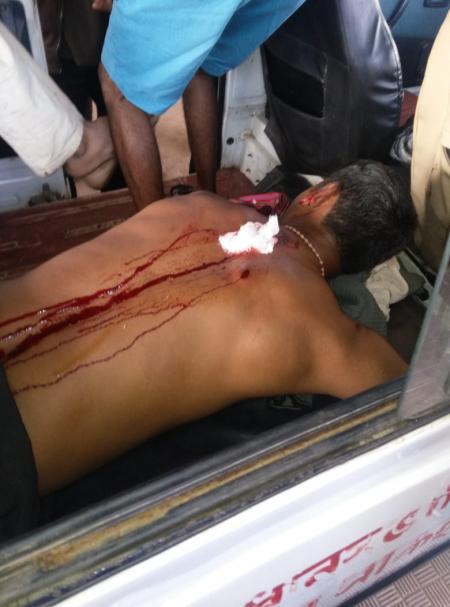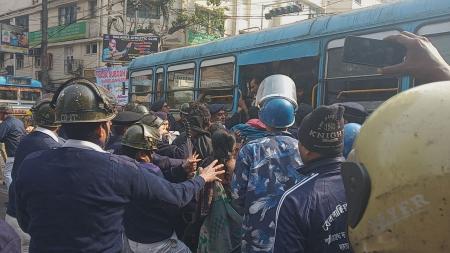#WorkersStrikeBack: Bengal Workers Brave Police Repression to Make Historic Strike A Success

Bengal Workers Brave Police Repression to Make Historic Strike A Success
Kolkata: On January 8, crores of workers from West Bengal- from the working class, farmers and agrarian workers- took part in the general strike called by ten central trade unions against the anti-people and anti-worker Modi Government, despite facing the brutal suppression of the Mamata Bannerjee-led Trinamool Congress (TMC) government.

Even after leaving no stone unturned to suppress the workers through police and TMC hooligans’ brutality, the ruling Modi-Mamata axis tasted the bitter taste of defeat before the determined activism of trade union activists. The strike was an immense success, as perhaps, for the first time in the last 40 years, people openly joined the National General strike on its first day in West Bengal.
In the tea gardens, jute sector, public sector units like Bank and Insurance, BSNL, Post and Telegraph, and the shipping sector, the strike was cent percent successful. Most shops and mercantile establishments remained closed, and while the TMC-led hooligans and police tried to ply private buses in the state, most people preferred to stay indoors. Even the shops which were forcibly opened, shut down hours later in want of customers, while barring government buses, that too in Kolkata, most vehicles decided not to ply in support of the strike. The state transport corporation posed a sorry figure too, where in North Bengal, NBSTC (North Bengal State Transport Corporation) was able to take out only 6 to 7 buses out of the declared 650 plus fleet as per announcements.
In the steel sector, despite the fact that hooligans were mobilised in the factory gates in Durgapur, there too only 40 per cent employees turned up. Ranigunj coal industry, Asansol, and Jamuria were closed, making the strike call an unprecedented success in the face of atrocities showered on the trade union activists and Left activists.
Police Action and TMC Hooliganism
In the morning itself, Centre of Indian Trade Union (CITU) General Secretary Anadi Sahu along with the prominent leaders of the central trade unions (CTUs) were arrested in Sealdah for participating in a rally supporting the strike. Anadi Sahu was particularly beaten up by the police before being arrested. In Jadavpur in south Kolkata, CPI(M) MLA Dr. Sujan Chakraborty was arrested for taking out a rally. Altogether, five CPI(M) [Communist Party of India (Marxist)] state committee members had been arrested by the police and they are still in police custody. This led to a partial change of tactics by the picketers, who in a decentralised manner in over 1,500 places carried on picketing in support of the strike.
About 1,000 activists have been arrested while about 115 strike supporters were injured in the hand of brutal police force in the state, CPI(M) State Secretary Dr. Suryakanta Mishra said in a press conference on January 8. He also announced that on January 9, the strike will be intensified and along with the demands of the strike, there will be an added protest programme against the police and TMC brutality on the striking workers and their supporters. He also announced that the Left will lodge a FIR against the Food Minister of the state Jyotipriya Mallick who had threatened to skin alive Dr. Suryakanta Mishra and Left Front Chairman Biman Basu, if they come out in support of the strike.

Earlier in the afternoon on January 8, the leaders of the ten CTUs led by CITU State President Subhas Mukherjee announced in a press conference that the unprecedented success of the strike is a result of the oppression showered on the common people by the Modi-Mamata axis. Suryakanta Mishra also blasted at the torturous tactics of the state government saying that it has proved the state CM as the most potential ally of the Modi government. State Congress President Somen Mitra too, alleged that Modi and Mamata’s covert understanding has now come to the open.
Due to staff shortage, electricity generation was hard hit with nearly 472 megawatts less power generated in the state. In several jute mills of the state, the authorities were forced to shut down for the day due to staff shortage, even including units run by the Birla group.
In West Medinipore, Burdwan. Jalpaiguri and North Dinajpur districts, agrarian workers also joined the striking workers, by blocking highways and roads. In Howrah district, CITU activists frequently fought pitched battles with the police. Daily life was hard hit in all the districts of the state. In the hill district of Darjeeling, tea workers took out a rally in Bijanbari, Kurseong and other places.
With the general strike continuing on January 9, protests from the workers are expected to intensify and more and more workers are expected to join the strike.
Get the latest reports & analysis with people's perspective on Protests, movements & deep analytical videos, discussions of the current affairs in your Telegram app. Subscribe to NewsClick's Telegram channel & get Real-Time updates on stories, as they get published on our website.
























